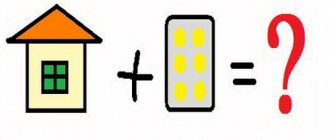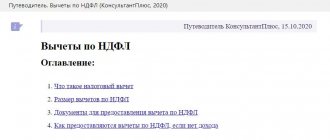A standard tax deduction is an operation to subtract a certain amount (its amount is determined by law), not subject to taxation, from the taxpayer’s total income. Income must be considered funds that were received from the actions of a citizen for a given taxable period. Different tax rates may apply. If we talk about START (standard tax deduction), then when presenting it, only income taxed at a rate of 13% is taken into account.
It's worth noting when looking at the standard child tax deduction in 2015: The tax code provides a variety of options for using them, which we'll discuss below. In this article we have collected information about this: what amount of deduction is intended for a child, deduction codes, limits, double deduction, how to take advantage of benefits for children, who is entitled to them.
Other types of strategic offensive weapons
When considering the standard child tax deduction for 2015, don't forget about other deductions. Thus, tax legislation provides for certain circumstances and categories of citizens in which and for which other tax deductions can be applied. The following are entitled to them:
- liquidators of the consequences of the accident that occurred at the Chernobyl nuclear power plant;
- disabled people of the Second World War;
- victims of a radioactive accident at the Mayak production association.
The amount of the deduction varies depending on these indicators. It is clear that the use of START by the above categories of citizens is a rare occurrence, since in most cases these individuals receive tax-free pensions. Now we will find out what standard tax deductions for children are provided in 2015, what changes are available in this area, and what important details taxpayers should pay attention to.
Tax deduction in 2015
Hello, friends. Today we will talk about the different types of tax deductions that every citizen of our country can claim and what changes have occurred in 2015.
A standard tax deduction is a benefit that reduces the amount of tax levied on an individual’s income: the deduction is subtracted from the total amount of income (salary), and the tax is calculated on the resulting balance; “net” wages increase.
Tax deductions in 2015 are carried out after submitting the appropriate application. In it, the taxpayer must indicate what deductions must be made and what are the reasons for them. Deductions are provided only to residents of the Russian Federation.
The taxpayer is entitled to a reduction in the amount of income by the amount of money he spent on:
- study;
- treatment (your own and your relatives);
- funded pension;
- agreements between DSZH, NGOs and DPS.
The maximum annual deduction is 120 thousand rubles. If the amount is not “selected”, then no balances can be carried over to the next year.
To receive such benefits, the taxpayer should contact the tax office by submitting an application and attaching relevant documents that will confirm his right to receive the benefit.
To myself
These categories of individuals are entitled to tax deductions for personal income tax 2015 in the amount of 3 thousand rubles:
- disabled people of the Great Patriotic War;
- “Chernobyl survivors”, liquidators of the accident at Mayak and other radiation accidents;
- participants in atomic weapons tests;
- military personnel who become disabled while performing their duties.
A 500-ruble deduction is due:
- heroes of the USSR and the Russian Federation, holders of the Order of Glory;
- participants of the Second World War, military operations, partisans, civilians who worked with the army or navy during the Second World War;
- blockade survivors;
- former concentration camp prisoners;
- disabled people of groups I and II.
For children
The 2015 child tax deduction is provided when the taxpayer belongs to a category whose income is taxed at a 13% rate, and as long as it does not exceed 280 thousand rubles (for example, an employee with a salary of 20 thousand rubles will receive a deduction for all 12 months, in 26 thousand - except December, and 30 thousand - except November and December).
A deduction is issued for each child if he has not reached the age of 18, and if he is a full-time student, then until he turns 24.
For the 1st and 2nd children, 1400 rubles are deducted. per month, for each next – 3 thousand rubles. If the child is disabled, then 3 thousand rubles. until the age of 18, and if he is disabled of group I or II, and is studying at a hospital, then until he is 24 years old. When a child is on academic leave, the deduction is still made.
It doesn’t matter how old the first child is: even if he is over 24 years old, then for the second and third, deductions are made as indicated above.
Deductions are not cumulative: if a child is disabled, then he is entitled to a deduction of 3 thousand rubles, regardless of whether he is the first or the fourth. The deduction can be issued at the place of work or at the tax office.
A taxpayer working in two or more places can file a deduction in one or any of them.
When do benefits start and end?
The deduction is made for the month when the child was born. In case of adoption or taking into guardianship - for the month when this event officially occurred.
The 2015 tax deduction is provided until the end of the month in which the child has a birthday and he turns 24 if he is a full-time student or until the end of the calendar year when he turns 18 - if he is not a student.
If the child died or the guardianship agreement expired (or was terminated early for some reason), then after the end of the month when this happened, the deductions stop.
If the father and mother are divorced, then the deduction is due to each of them and their new spouses (the father and his wife - only if he pays alimony).
To apply for a deduction, in addition to the application and birth certificate, the father provides a certificate of regular payment of alimony, his wife - a marriage certificate with him, the mother's husband - a marriage certificate and confirmation that he lives with his wife and her child (instead of copies of all documents are provided).
The transfer of the right to benefits from one parent to another is allowed, but only in the case when both of them are entitled to them (see above). The second one will receive a double deduction. A non-working person (on maternity leave, unemployed, disabled, etc.) cannot transfer the benefit to the second parent, since he has no right to it.
If a child has only one parent and this is confirmed by relevant documents, then this parent is entitled to a double benefit.
Deductions for housing
The 2015 property tax deduction is provided from the moment you submit an application for this benefit. It is possible if you have become the owner of a home (entirely or only part) or a plot where you will build a home. Also, if you took out a loan from a bank for these purposes, then a deduction is also due for its repayment.
The tax deduction for an apartment or house in 2015 will be equal to its price, but will not be more than 2 million rubles. When making a joint purchase (for example, with a spouse), it is due to each of the co-owners. When repaying the loan, the largest amount of deduction is already 3 million.
It can be issued with one agent or several, but it cannot be more than the maximum established amount. To complete it, you will need an application and documents that confirm that you have become the owner of the home (paying interest on the loan).
Let's look at a simple example: with an apartment price of 3 million rubles. the deduction is 2 million, you will get back 260 thousand rubles, and if the cost is 1.7 million, you will get back 221 thousand.
If the payment for the apartment was made from maternity capital money, there are no benefits, but if only part of the purchase was paid for with this money (or there was a subsidy from the budget, or the housing was partially paid for by the employer), it is subtracted from the total cost of the purchase, and the deduction is equal to the balance (total cost minus this part).
Innovations for this year
Some changes have been in effect since the new year: the 2015 tax deduction now also exists for the tax on the sale of securities.
The addition to Article 219.1 has been in effect since the beginning of 2015. Investment tax deductions 2015 will be carried out in the amount
- sale of securities – if an individual has owned them for more than three years;
- money deposited by an individual into his own IP (individual account);
- profits from transactions accounted for on an IIS (individual investment account).
IIS is an absolute analogue of a regular brokerage account, which allows, in addition to income from operations on the stock market, to receive a tax deduction,
guaranteed by the state, and thereby increase the efficiency of your investments.
Now you know what benefits you can count on, so don't miss the opportunity to take advantage of these benefits.
If this article was useful to you, please do the following...
1) Like and retweet.
2) Share this post with your friends on social networks.
Good luck to you! Guzel Minyazova
Right to deduction for a child
The deduction is applicable in relation to:
- adoptive parents;
- parents;
- guardians and other persons who are equated to the above category.
These statuses require official recognition; in other words, documented information is required, which is contained in acts of guardianship authorities, birth certificates, and court decisions recognizing paternity. In addition, the legislator determines the category of the child’s age in accordance with which the corresponding deduction is provided:
- up to 24 years of age, if the child is studying full-time at an educational institution or is an intern, graduate student, or resident;
- up to 18 years old.
In addition, standard child tax deductions in 2015 are provided separately for disabled children.
Parents have a question about whether it is possible to receive this deduction if their son/daughter is studying for a master's degree. Maybe. Currently, higher education is divided into two levels. Master's degree (2nd stage) is not considered as receiving a second higher education, therefore, if students are not yet 24 years old and are studying for a master's degree, then their parents can receive standard tax deductions for children in 2015, the maximum amount of which is 3,000 rubles , only on the condition that education is obtained for the first time at the second stage.
Law No. 420-FZ[1]
From 01/01/2015 Ch. 23 of the Tax Code of the Russian Federation was supplemented by Art. 219.1 “Investment tax deductions” . According to clause 1 of this article, when determining the size of the tax base in accordance with clause 3 of Art. 210 and art. 214.1 of the Tax Code of the Russian Federation, taxpayers have the right to receive investment tax deductions provided taking into account the specifics and in the manner provided for in Art. 219.1 Tax Code of the Russian Federation [2].
By virtue of paragraph 1 of Art. 219.1 of the Tax Code of the Russian Federation, a social tax deduction will be provided:
- in relation to income received from the sale (redemption) of securities acquired after 01/01/2014 and owned for more than three years ( clause 1, article 5 of Law No. 420-FZ ), accordingly, the possibility of exercising the right to the specified deduction will arise only after 01/02/2017 ;
- in the amount of funds contributed by the taxpayer during the tax period to an individual investment account, the agreement for the maintenance of which was concluded after 01/01/2014 ( clause 2 of article 5 , clause 1 of article 6 of Law No. 420-FZ );
- in the amount of income received from transactions that are accounted for on an individual investment account, the agreement for the maintenance of which was concluded after 01/01/2014 ( clause 2 of article 5 , clause 1 of article 6 of Law No. 420-FZ ), subject to the expiration of at least three years from the date of its conclusion, accordingly, the right to the specified deduction will first arise after 01/01/2017 .
Deduction amount
Such a deduction can be taken into account up to the month when the taxpayer’s income since the beginning of the year, with an increasing total, exceeded 280,000 rubles. In this case, the size of the strategic offensive force is always differentiated:
- for the 1st and 2nd child – 1400 rubles;
- on the 3rd and subsequent days - already 3,000 rubles;
- standard tax deductions for a disabled child are 3,000 rubles. For example, if such a baby is the first-born, the deduction amount will still be 3,000 rubles.
The principle of using a deduction is additive, in other words, each deduction is added to the previous one, but is not absorbed. So, if there are 4 children, then the total deduction for them will be 8800 rubles.
It should be taken into account that each parent can receive a deduction in the specified amounts.
Period and conditions of deductions
"Children's deductions" are provided:
- up to the month in which income, calculated on an accrual basis from the beginning of the tax period, exceeded 350,000 rubles; - until the end of the year in which the child (children) reached 18 years of age; - until the end of the year in which every full-time student, graduate student, resident, intern, student, cadet reaches 24 years of age; - until the end of the year in which the agreement on the transfer of the child (children) to be raised in a family expires or is terminated early, or in the event of the death of the child (children).
The provision of a double tax deduction to a single parent ceases from the month following the month of his marriage.
How is the order of babies determined?
Children are ranked chronologically, depending on their age. So, the first baby is the oldest, and then in descending order.
For example, there are four children in a family. 1st - 25 years old, 2nd - 17 years old, 3rd - 15 years old, 4th - 10 years old. In this case, standard tax deductions for children in 2015 will be distributed as follows:
- 1st child - 0 rub.;
- 2nd — 1400 rub.;
- 3rd - 3000 rubles;
- subsequent ones - 3000 rubles.
Or another example. There are 3 children in the family: the 1st child does not study at the age of 22, the 2nd child died at 15 years old, the 3rd is an 8-year-old child. In this case, parents have the right to a standard tax deduction for a child 8 years old in the amount of 3,000 rubles.
Law No. 382-FZ[10]
1. From 01/01/2015 pp. 4 paragraphs 1 art. 219 of the Tax Code of the Russian Federation is supplemented by a provision according to which the social tax deduction applies to the amounts of insurance premiums paid by the taxpayer in the tax period under a voluntary life insurance agreement (agreements) concluded with an insurance organization.
In addition, the following conditions must be met:
- the contract must be concluded for a period of at least five years;
- the agreement must be concluded in one’s favor and (or) in favor of a spouse (including a widow, widower), parents (including adoptive parents), children (including adopted children under guardianship (trusteeship));
- the deduction must be provided in the amount of actual expenses, taking into account the established limit in the amount of 120,000 rubles. (according to the totality of individual deductions provided for in paragraphs 2 - 5, paragraph 1, article 219 of the Tax Code of the Russian Federation ).
It should be noted that the right to realize the specified deduction will arise for the first time in 2021 in relation to the corresponding expenses of the taxpayer incurred during the tax period of 2015, however, the date of conclusion of the agreement does not matter.
Example 4.
In March 2012, the taxpayer entered into a voluntary life insurance agreement with an insurance organization for a period of 10 years, under which insurance premiums are paid quarterly. For amounts paid during 2015, the taxpayer has the right to claim a social tax deduction.
We note that by virtue of clause 2 of Art. 219 of the Tax Code of the Russian Federation, the specified deduction can be provided to the taxpayer before the end of the tax period (that is, already during 2015) when he contacts the employer, subject to documentary confirmation of the relevant expenses and in the event that contributions for voluntary life insurance were withheld from payments in favor of the taxpayer and were transferred to the relevant insurance organizations by the employer.
At the same time, it is necessary to keep in mind the changes made to paragraphs. 2 p. 1 art. 213 of the Tax Code of the Russian Federation , according to which in the event of termination of a voluntary life insurance contract (except for cases of termination of voluntary insurance contracts for reasons beyond the will of the parties), when determining the tax base, the amounts of insurance premiums paid by an individual under this contract, in respect of which he was social tax deduction provided. In this case, taxation is carried out by the insurance organization, and the tax is calculated from the amount of insurance premiums. The tax is not calculated if the taxpayer submits a certificate from the tax authority confirming that he did not receive a social tax deduction ( clause “b”, paragraph 9, article 2 of Law No. 382-FZ ).
2. Paragraph no longer in force. 6 and 8 clause 8 art. 217 of the Tax Code of the Russian Federation , concerning the exemption from taxation of lump sum payments that were paid to taxpayers and members of their families in connection with natural disasters, emergencies and terrorist acts ( subparagraph “a” , paragraph 10, article 2 of Law No. 382-FZ ).
Instead, Art. 217 of the Tax Code of the Russian Federation was supplemented with clauses 8.3 and 8.4 , similar in content to the specified norms, but there is one exception: from 01/01/2015, the corresponding payments are not subject to personal income tax, regardless of the number of payments made by the tax agent, that is, the one-time criterion does not apply.
3. The new wording contains clause 26 of Art. 217 of the Tax Code of the Russian Federation ( clause “g”, paragraph 10, article 2 of Law No. 382-FZ ).
Previously, the income of socially vulnerable children received only from non-profit organizations was not subject to personal income tax.
From 01/01/2015, for the purposes of tax exemption, the source of payment of income does not matter, that is, any tax agent making the appropriate payments has the right to take advantage of this benefit.
Who provides this deduction?
The deduction is provided to the recipient by his employer, and if there are several of them at once, the priority is determined by the choice of the employee. The employer makes the necessary calculations, after which he pays the tax and reports to the tax office. All you have to do is look through receipts and wage statements, carefully monitoring whether the deduction has been taken into account. If an error is identified, you need to report it to the company’s accounting department.
Refund of excess personal income tax through the tax office
If standard tax deductions for children were not made (documents were not provided to the company’s accounting department), or the company’s accounting department made mistakes and the deductions were not taken into account in full, then their recipient can independently contact the tax authority after the taxation period. But in practice, such cases are very rare; in general, it is easier to do this with the employer by submitting an application in a timely manner. The following must be submitted for a child tax refund:
- certificate 2-NDFL from the place of work;
- declaration 3-NDFL;
- certificate from school or other educational institution.
The standard child tax deduction is obtained by not withholding amounts from wages. The employer, if there are grounds, is obliged to subtract the deduction amount from the salary amount, and apply the tax rate to the remaining amount.
What documents need to be submitted to the company’s accounting department to receive this deduction:
- Documents for children (certificate of the guardianship authority, document from the court recognizing paternity, birth certificate).
- The employee provides the employer with a free-form deduction application at his or her request.
- If the child is 18-24 years old and is studying full-time at a university, a certificate of enrollment will be required.
- If one of the parents transfers the right to receive this deduction to the other, then a corresponding statement, as well as a certificate from work stating that there are no other deductions.
- If the baby is disabled, then a document confirming the disability and a medical report.
These documents can be provided to the employer only once; you do not need to write an application every year. Only when changing place of work do you need to submit an application and documents to the new employer, attaching a 2-NDFL certificate from your previous place of work.
Law No. 368-FZ[7]
From 01/01/2015, the provisions of clause 2 of Art.
226 and art. 227.1 of the Tax Code of the Russian Federation concerning foreign citizens paying fixed advance payments for personal income tax. Let us recall that from July 1, 2010, migration patents were introduced in the Russian Federation, allowing certain categories of foreign individuals to work for Russian citizens for hire to perform work for personal, household and other similar needs not related to business activities.
The main commentary to Law No. 368-FZ is given in the Information Notice of the Federal Tax Service of the Russian Federation dated December 11, 2014, which, in particular, notes that the new procedure for paying personal income tax applies to foreign citizens working (performing work under civil contracts) under a patent not only for individuals, but also for organizations, individual entrepreneurs or individuals engaged in private practice (for example, governesses, gardeners, nurses, etc.).
Thanks to the innovations, organizations, individual entrepreneurs or individuals engaged in private practice will be able to hire foreign citizens who arrived in the Russian Federation on a visa-free basis, on the basis of a patent (clause 1, article 13.3 of the Federal Law of July 25, 2002 No. 115-FZ “On Legal the situation of foreign citizens in the Russian Federation" (hereinafter referred to as Law No. 115-FZ ) as amended in force from 01/01/2015).
Please note that foreign citizens temporarily staying in the Russian Federation are required to obtain a patent. Persons permanently or temporarily residing in the Russian Federation, as well as refugees, journalists, athletes and some other persons are exempt from the obligation to obtain the appropriate patent ( clause 4 of article 13 of Law No. 115-FZ ). Also, citizens of the Republic of Belarus and the Republic of Kazakhstan do not need to obtain a patent ( Article 3 of the Agreement on the legal status of migrant workers and members of their families , ratified by 186-FZ of July 11, 2011 ).
These foreign citizens are required to pay fixed advance payments for personal income tax for the period of validity of the patent, issued for a period of one to 12 months (previously - from one to three months), in the amount of 1,200 rubles. per month (previously – 1,000 rubles per month).
The payment is subject to indexation by the deflator coefficient established for the corresponding calendar year[8], as well as by the coefficient reflecting the regional characteristics of the labor market, established for the corresponding calendar year by the law of the constituent entity of the Russian Federation[9] (previously - since 2012 only by the deflator coefficient provided at the federal level). If the regional coefficient for the next calendar year is not established by law of a constituent entity of the Russian Federation, its value is taken equal to 1.
Since 2015, an employer (customer) - an organization or an individual entrepreneur (private practitioner) who has hired a foreign citizen on the basis of a patent, can reduce the amount of personal income tax calculated on the income of such an employee for the tax period by the amount of fixed advance payments that the employee made for the period of validity of the patent relating to this tax period.
Such an obligation will arise for the tax agent after receiving from the foreign employee an application and documents certifying the payment, and from the tax authority at its location - a notification confirming the right to the said reduction. The tax authority must send this notification to the tax agent within 10 working days from the date of receipt of the relevant application from him (if the necessary information is available from the territorial body of the Federal Migration Service).
For a specific taxpayer, a notification can be sent only once in relation to the tax period.
Please note that in relation to previously issued patents until their expiration, the previous procedure for calculating and paying personal income tax remains the same.
Document submission time
At the birth of a child, each employee can write a statement and also provide a birth certificate. The deduction will be carried out from this moment.
Also, when applying for a new job, you must immediately write an application, bring a birth certificate, in addition, a 2-NDFL certificate received at your previous place of work.
If an employee was hired and for some reason did not immediately provide the documents, but brought them before December of this year, the accounting department is obliged to recalculate the overpaid amount of personal income tax for this year.
Calculation of personal income tax refund amount
The tax refund calculator is an online tool that allows you to calculate not only the amount of the deduction, but also estimate how long it will take at your current level of income to reimburse expenses under this personal income tax exemption.
The interactive service is a form where you need to enter initial data:
- price of purchased housing;
- the amount and term of the loan, the interest rate on it;
- the amount of “white” wages from which income tax is transferred.
In the results, the deduction calculator will provide information on the amount of the required property deduction, both in terms of repayment of loan interest and in relation to the cost of purchased living space, as well as the amount of savings and the amount receivable (13% of income that is exempt from taxation) throughout years until the deduction is completely exhausted.
You will probably be interested in looking at the “Residential Exchange” mental map, which explains in detail the difference between buying and exchanging housing
Or HERE you will learn about the procedure for granting leave without pay
Children's rights in Russia:
Standard tax deductions for children if parents are divorced or in a common-law marriage
How does the law work in cases where there is no marriage registration between the parents of a child? Standard tax deductions for a child, if the parents are divorced, can be received by both parents, but a prerequisite is confirmation of the fact that the minor citizen is supported by them. In this case, you must provide the following official documents:
- certificate of registration (registration of the child) at the place of residence of the parent;
- a copy of the court decision stating who the child lives with;
- agreement between parents regarding payment of child support.
Deductions for the carry forward of losses from securities and forward transactions
A lot of people who are involved in securities or derivatives transactions have troubles after the end of the reporting period. Often, this is due to the fact that during this period the amount of income is less than the amount of waste. Therefore, in order to support citizens who find themselves in such a situation, the state has provided for the transfer of payment to a later date.
At the same time, it is worth remembering that such a transfer is only possible if the situation was caused directly by a loss caused by the above reasons. This amount is carried forward directly to the next tax period.
Get double standard tax deductions
If adoptive parents (parents) wish, standard tax deductions for children can be replaced by a double deduction, which will be received by one of them. To do this, it is enough to bring a statement of refusal of either parent to receive such a deduction, and the refusing parent provides a 2-NDFL certificate every month.
For such a transfer of the right of deduction, a prerequisite is that the transferor has a permanent income that is subject to personal income tax; in other words, an unemployed person cannot transfer his right of deduction to his spouse.
Therefore, in order for one of the parents to receive standard double tax deductions for a child in 2015, additional documents are needed:
- every month - personal income tax certificate 2, in addition, a statement of refusal of the parent;
- application for a second tax deduction for a child from the second parent.
In addition, single mothers are entitled to a double deduction. They must provide a certificate of form 25, which was received at the registry office and confirms the status of a single mother.
The standard double tax deduction is applied, like a simple one, up to a certain total annual income, more precisely, up to the month when the salary reaches 280,000 from the beginning of the year.
How to transfer standard personal income tax deductions
The Ministry of Finance of Russia, in letter No. 03-04-06/8-36 dated 02/06/2013, explained how to provide “children’s” deductions to employees when the employee did not receive income for several months during the year and, accordingly, he did not immediately have the opportunity to exercise the right to professional deduction.
For example, this often happens to women who were on maternity leave. Another common situation is when an employee goes on leave without pay for a long time. A natural question arises: can the employer provide all accumulated deductions immediately after income appears?
The employer must provide standard deductions for each month of the tax period (subclause 4, clause 1, article 218 of the Tax Code of the Russian Federation). However, the Tax Code imposes a restriction on the possibility of obtaining a deduction - it applies only to income subject to personal income tax at a rate of 13% (paragraph 1 of Article 218 of the Tax Code of the Russian Federation). Accordingly, the employer does not have the opportunity to provide a deduction in a month if:
- the employee did not receive income;
- received income that is not subject to personal income tax;
- received income taxed with personal income tax at a rate other than 13%.
As we see, the employer simply may not physically be able to provide a deduction to the employee. What is the right thing to do here? Financiers suggested that in this case the deduction does not expire, but is transferred to the next month in which the employee will have income subject to personal income tax at a rate of 13%.
The letter addressed a specific situation where the employee was on maternity leave and received only maternity benefits. Let us remind you that, on the basis of paragraph 1 of Article 217 of the Tax Code of the Russian Federation, it is not subject to tax. This means that the employer could not provide deductions for the months of maternity leave. According to the Ministry of Finance, these deductions need to be summed up and provided when the employee receives her first salary after returning from maternity leave. In this case, of course, we are talking about deductions for the months of the current year. Deductions are not carried over from the previous calendar year.
Of course, the transfer of deductions is not limited to the case when the employee was on maternity leave. Other typical situations in which the accounting department must transfer deductions include an employee being on parental leave and leave without pay, as well as salary delays.
When providing deductions for past months, you need to keep two things in mind. The first is that “children’s” deductions are made up to the month in which the employee’s income from the beginning of the year exceeded 280,000 rubles. And when calculating this maximum amount, you need to take into account only income subject to personal income tax at a rate of 13%. And those payments that are not taxed (or taxed at a different rate) are not included in the calculation of the maximum amount (subclause 4, clause 1, article 218 of the Tax Code of the Russian Federation).
And the second point. The employer does not have the right to provide a deduction in advance. For example, when paying salaries for June, you cannot provide deductions for June and July at the same time. That is, an employee can receive deductions for months on maternity leave only after returning to work. In particular, the Ministry of Finance of Russia draws attention to this in letter dated May 11, 2012 No. 03-04-06/8-134.
Such situations should not be confused with the case when an employee was not hired from the beginning of the year. For example, in May. Provide such employees with deductions only for the months during which the employment contract is valid (that is, from May). Deductions for previous months cannot be provided, even if they were not provided by the former employer or the citizen did not work anywhere at that time. This conclusion is confirmed by recent clarifications from the Ministry of Finance (see letter dated February 27, 2013 No. 03-04-05/8-154).
So, we found out that deductions for a child for months in which the employee did not have income subject to personal income tax at a rate of 13% must be provided from the next salary. The question arises: what to do if such income does not appear (for example, if the employee is on maternity leave, parental leave, leave without pay, etc. until the end of the year)? Or if the income received after starting work is not enough to receive all the accumulated deductions?
According to the financial department, in such a situation, the tax agent must provide tax deductions retroactively - that is, from income that was paid to the employee before the start of the “non-deduction” months. Of course, this can only be done if the employee had income subject to personal income tax in the current year. To provide a deduction from previously paid income, you will have to recalculate the tax (letter of the Ministry of Finance of Russia dated July 23, 2012 No. 03-04-06/8-207). How to do this is shown in an example.
The employer must provide standard deductions not only to full-time employees, but also to those who work under civil contracts. Since there are no restrictions in this regard in the Tax Code.
Often seasonal workers who work several months a year enter into such contractual relationships. Provide them with deductions only for the months of the civil contract. Otherwise, you need to adhere to the rules that you use to provide deductions to full-time employees. Namely: the accounting department must comply with the employee’s income limit from the beginning of the year (no more than 280,000 rubles) and have an application for deduction and supporting documents. In particular, the Ministry of Finance of Russia draws attention to this in letter dated 04/07/2011 No. 03-04-06/10-81.
Typically, an employee receives remuneration under a civil contract not monthly, but in a lump sum upon completion of work. In this case, deductions must be provided not monthly, but at the time of payment of remuneration - for all months at once.
Standard tax deduction for a child with a single parent
The Ministry of Finance notes that a parent is not the only one if the marriage between the child’s parents is simply not registered. In other words, failure to pay alimony, divorce, or deprivation of parental rights of the second spouse is not the basis for the claim that the child has a single parent. To confirm the absence of the second parent, you must provide one of the following documents:
- birth certificate, which will indicate only one parent;
- a court decision legally establishing that the second parent is missing;
- a certificate from the registry office confirming the fact that the second parent was recorded on the birth certificate according to the mother’s words;
- death certificate of one of the parents.
START Limitations
According to the legislation, standard child tax deductions in 2015 are made taking into account income that is taxed at an interest rate of 13%, although this income is still not fully covered by this deduction. The legislator determined that deductions can be made from income declared by the tax agent.
In this case, the employer can declare as a tax agent only the wages of its own employee. Consequently, if a citizen did not work anywhere temporarily (for example, during 2014), he will not be able to receive a standard tax deduction. At the same time, at that time he could have had some other sources of income (for example, rent for real estate that this citizen rents out). A citizen can even report them to the tax authority, paying the tax in good faith, but still he will not receive a deduction.
If the deduction was not provided by the employer, it can be obtained after the tax period at the tax office by filling out the appropriate application there. In the future, you will only need to submit an application to your current employer, and then receive a deduction for all future periods, without wasting your own time and effort.
Law No. 285-FZ[3]
Clause 42 of Art. 217 of the Tax Code of the Russian Federation (as amended until January 1, 2015) it was established that funds received by parents, legal representatives of children attending educational organizations, in the form of compensation for part of the parental payment for the maintenance of a child in educational organizations that provide basic general education are not subject to personal income tax. preschool education program.
The Ministry of Finance, having analyzed the provisions of Part 5 of Art. 65 of the Federal Law of December 29, 2012 No. 273‑FZ “On Education in the Russian Federation” (hereinafter referred to as Law No. 273‑FZ ), which entered into force on September 1, 2013, came to the conclusion that compensation for part of parental fees not made at the expense of budgets of the constituent entities of the Russian Federation, but at the expense of other sources, cannot be considered as compensation for part of parental pay in the sense of Art. 65 of Law No. 273-FZ . Accordingly, such payments are not subject to clause 42 of Art. 217 of the Tax Code of the Russian Federation and are subject to personal income tax in the prescribed manner[4].
At the same time, the tax authorities, when taxing these compensations, were guided by the Letter of the Federal Tax Service of the Russian Federation dated September 17, 2009 No. ШС-22-3/719 , which explained that clause 42 of Art. 217 of the Tax Code of the Russian Federation does not contain restrictions on the form of ownership of educational institutions and the source of financing, therefore, the amount of compensation for part of the parental fee for the maintenance of a child in educational institutions (regardless of the owner and source of financing) that implement the basic general educational program of preschool education are not subject to personal income tax.
On January 1, 2015, the new version of clause 42 of Art. 217 of the Tax Code of the Russian Federation, according to which funds received by parents (legal representatives) of children attending educational organizations implementing an educational program of preschool education are exempt from personal income tax in the form of compensation for part of the parental fee for the supervision and care of children in these educational organizations, provided for by Law No. 273‑FZ .
Based on clauses 5 and 7 of Art. 65 of Law No. 273-FZ, payment of the said compensation relates to the expenditure obligations of the constituent entities of the Russian Federation.
Accordingly, from 01/01/2015, compensation for parental pay paid at the expense of the employer is subject to personal income tax in accordance with the generally established procedure.
START compatibility
This type of tax deduction is compatible with other types of standard deduction, including property, social and professional. In other words, all these deductions complement each other and add up. But it is necessary to take into account that if the accrual of such deductions turns out to be even slightly more than income, then these excess amounts are equal to zero, since the deductions are exclusively compensatory in nature, and their effect depends directly on the tax activity of each taxpayer.








